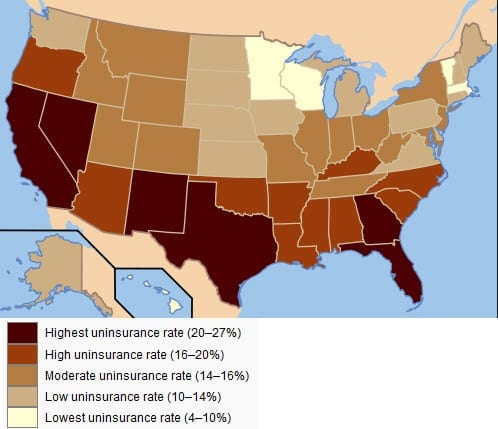
Report provides further insight into the health insurance problem of some states
A recently released report from the U.S. Census Bureau highlighted the shortfalls in health insurance across the country. The report draws attention to where health insurance coverage is scarce and attempts to provide some insight as to why this may be the case. Kansas made insurance news headlines late last month as it was highlighted in the report, but the Census Bureau notes that the state is not the only one suffering from lack of health insurance coverage.
Arizona and Texas boast of high uninsured rate
According to the Census report, Arizona is also suffering from a high uninsured rate for those below the age of 65. The report shows that approximately 19.3 of the state’s population in this age range in 2010 went without health insurance coverage, higher than the national average of 17.7% in the same period. Texas boasts of the worst coverage record, with 26.3% of its population uninsured in 2010. In both states, the numbers represent the amount of people seeking medical coverage that they cannot afford and that will go uncompensated.
Lack of health insurance may be driving up medical costs
Health care professionals are claiming that uninsured patients are a significant problem that should be addressed as soon as possible. Patients without health insurance frequent clinics that provide medical care, but these patients are often unable to afford the care they are given. Many simply do not pay their medical expenses because they do not have the money. This translates into a financial loss for health care providers, which encourages them to raise their prices for care. This, in turn, affects health insurance rates, making coverage more expensive.
Federal law may eventually bring relief
The Census report highlights a number of issues that exist in the country’s current health insurance landscape, many of them becoming well documented in 2010. The Affordable Care Act is expected to put some of these problems to rest, but the law does not go into full effect until 2014. Arizona and Texas are expected to continue grappling with the problems of uninsured patients until the law can provide some assistance.
